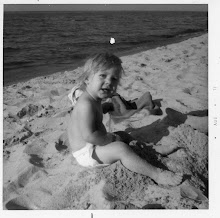I have in my possession a small stack of journals. Composition books in various degrees of dereliction, edges frayed and bindings fractured, in who’s yellowed pages are lines and thoughts and musings not my own. These diaries of a vintage nearly eighty years old all bear the name Lucille Andreano, a woman who, in the years of the writing of these journals, was coming into her womanhood.
In the glaring brightness of the dawn of adulthood, Lucille thought thoughts, dreamed dreams and found herself caught in the dilemmas of faith and doubt, human need and humanism, spirituality and wisdom. She was becoming a woman in modern times. The age of industry had catapulted the American economy into first position on the globe, yet signs of a nation cracking under greed and progressivism dotted the landscape of her view. She was the firstborn of three daughters born to an unlikely pair: a Protestant German farm girl and an Italian-immigrant Catholic cobbler. Many years separated the three daughters, and Lucille acted more of a mother to her sisters than the hard-working, book-keeping matron of the family. She was an artist, first in soul, for she loved literature and the music of words and second, as a musician. She received a benevolent gift of music instruction throughout her school years and eventually became a concert violinist, playing many years in chamber groups and later, in the LaPorte, Indiana Symphony Orchestra. I never really knew her. She was my aunt, my mother’s sister.
After Lucille’s death, her son passed letters and journals to my mother, the youngest of the three girls. After reading them herself, she, in turn, passed the journals on to me. I felt honored, truly, to be entrusted with them, because we are sadly a family of little “family history.” My own mom concerned herself with being an all-American girl. After all, with Hitler and Mussolini in their heyday during her youth, who would want to be known as an Italian or a German, let alone both, in small-town middle America? She didn’t learn to cook or speak Italian from her Daddy who had emigrated as a young man. She never inherited any family recipes or traditions from her mother, a full German-American, the eldest of thirteen children who was herself ostracized by her siblings for decades because of a family squabble over land inheritance.
But that’s a different story. The journals I now keep with care in my own suburban home don’t tell the story of my deceased family. They don’t tell the story of my aunt’s life. They are filled with selections of writings that meant something, spoke something, to this woman I had only met once. I was a child, and she an old woman who lived alone in a small apartment in New Hampshire, drapes drawn in quiet solitude. She meant little to me outside of the fact that my mother always admired her. She had extolled Lucille’s qualities of gentleness and care in her own childhood. She spoke in almost reverent tones about Lucille’s gift of music and the tragic loss of years when her husband refused to let her play her own violin, and later, of Lucille’s personal triumph in returning to public performing. Nevertheless, the journals sat for months on my closet shelf, safe from possible harm in my busy, child-filled home, but also, unread.
My mom pestered me, asking nearly every time we spoke on the telephone, “Have you read your Aunt’s books yet? There is so much in them that I think you’d like, that could lead you to write.”
And, finally, I began to read her scrawling cursive, less neatly penned than had it been intended for readers but the deciphering was slow going at times. What I’ve found in these journals is a posthumous soul mate of sorts, less of an elderly matron and more of a youthful woman whose life was spread before her. The banquet of moral and spiritual ethical and educational choices was overwhelming to her.
There is no story or narrative, only thoughts, both belonging to others and herself, strung along like twinkle-lights illuminating the heart-song of a woman who I do not know, yet whose flickering light has been made known to me through passages, poems, wonderings and quotes. The ideas she felt led to reproduce on her journal pages are ideas that quite possibly would have struck me, had I read the same texts as she and the discipline to copy them down. Her inquiries of what drives a human to be good or kind or hard-working or moral in any sense are some of the same questions I’ve posed to myself, my God and others caught in my debate. She wanted desperately to love the Gospels, but misunderstandings of the Old Testament narratives and laws shattered her faith. Into the broken lines of doubt extended the ideas and ideals of dozens of writers, philosophers and musicians.
Lucille was a woman who doubted, who was deeply passionate, who was seeking truth and true love, who loved art and music and people, and who most of all, questioned the purpose of her own existence. I found Lucille to be fascinating, human, lonely and most of all, loving. She felt poorly about her own goodness, yet to goodness was consistently drawn. In these lights and shadows of quoted prose and poetry, reason and humor, I found a kindred spirit and a lover of words more like myself than I had imagined.
